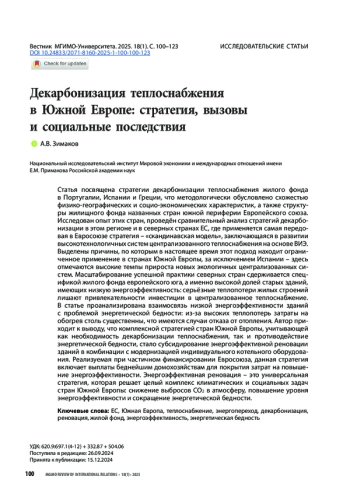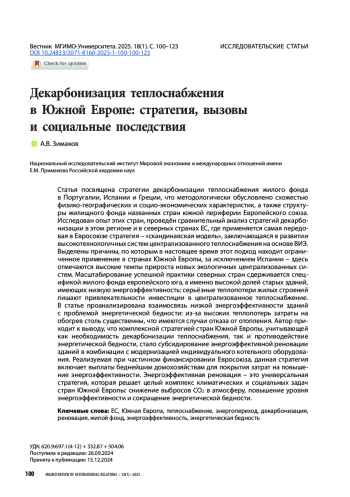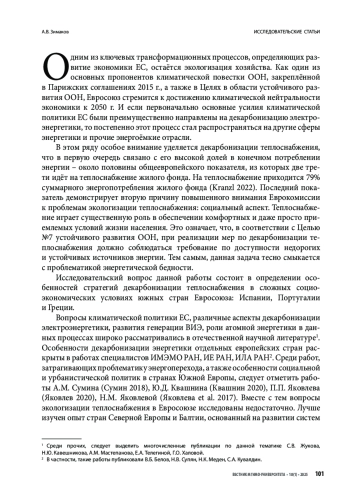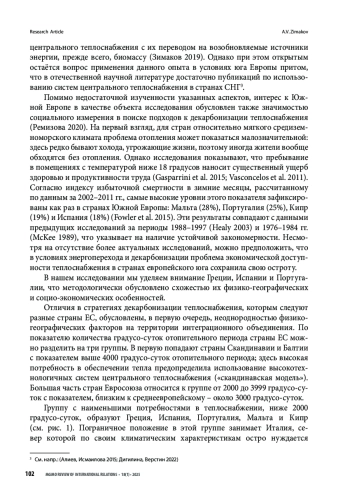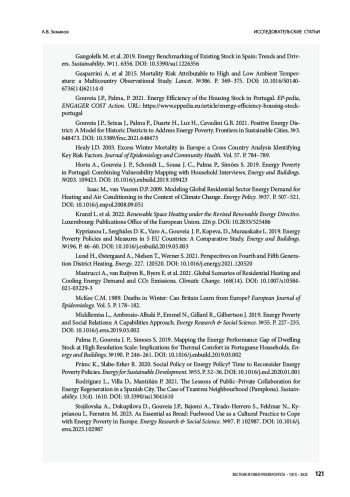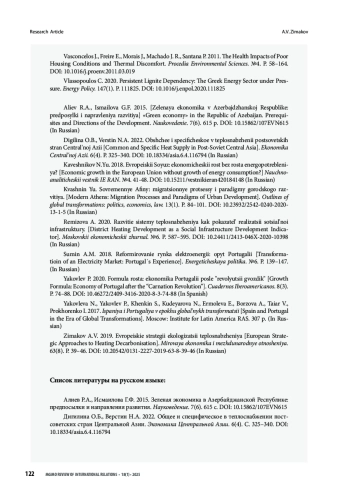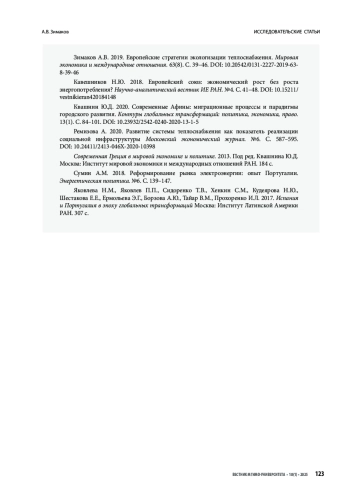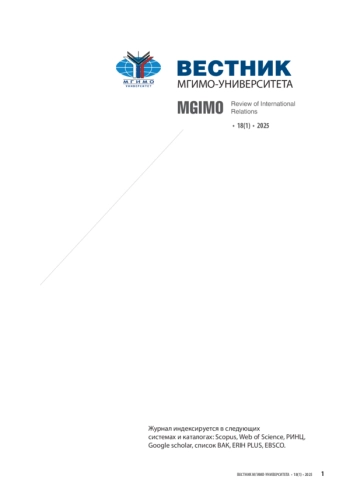1. Abbasi M.H. et al. 2021. Heat Transition in the European Building Sector: Overview of the Heat Decarbonisation Practices through Heat Pump Technology. Sustainable Energy Technologies and Assessments. 48(8). 101630. https://doi.org/10.1016/j.seta.2021.101630
2. Bellet Sanfeliu C. 2021. The Evolution of Urban Planning in Medium-Sized Catalan Cities (1979-2019). Urban Science. 5(2). 36. https://doi.org/10.3390/urbansci5020036
3. Bienvenido-Huertas D. 2020. Analysis of the Relationship of the Improvement of Façades and Thermal Bridges of Spanish Building Stock with the Mitigation of Its Energy and Environmental Impact. Energies. 13(17). 4499. https://doi.org/10.3390/en13174499
4. Buffa S., Cozzinia M., D’Antonia M., Baratierib M., Fedrizzia R. 2019. 5th Generation District
5. Heating and Cooling Systems: A Review of Existing Cases in Europe. Renewable and Sustainable Energy Reviews. №104. P. 504-522. https://doi.org/10.1016/j.rser.2018.12.059
6. Castellazzi L., Paci D., Zangheri P. et al. 2022. Assessment of the First Long-Term Renovation Strategies under the Energy Performance of Building Directive (Art. 2a). European Commission, Joint Research Centre, Publications Office of the European Union. 191 p. https://doi.org/10.2760/535845
7. Fowler T. et al. 2015. Excess Winter Deaths in Europe: a Multi-Country Descriptive Analysis.
8. European Journal of Public Health. 25(2). April. P. 339-345. https://doi.org/10.1093/eurpub/cku073
9. Gangolells M. et al. 2019. Energy Benchmarking of Existing Stock in Spain: Trends and Drivers. Sustainability. №11. 6356. https://doi.org/10.3390/su11226356
10. Gasparrini A. et al 2015. Mortality Risk Attributable to High and Low Ambient Temperature: a Multicountry Observational Study. Lancet. №386. P. 369-375. https://doi.org/10.1016/S0140-6736(14)62114-0
11. Gouveia J.P., Palma, P. 2021. Energy Efficiency of the Housing Stock in Portugal. EP-pedia, ENGAGER COST Action. URL: https://www.eppedia.eu/article/energy-efficiency-housing-stockportugal
12. Gouveia J.P., Seixas J., Palma P., Duarte H., Luz H., Cavadini G.B. 2021. Positive Energy District: A Model for Historic Districts to Address Energy Poverty. Frontiers in Sustainable Cities. №3. 648473. https://doi.org/10.3389/frsc.2021.648473
13. Healy J.D. 2003. Excess Winter Mortality in Europe: a Cross Country Analysis Identifying Key Risk Factors. Journal of Epidemiology and Community Health. Vol. 57. P. 784-789.
14. Horta A., Gouveia J. P., Schmidt L., Sousa J. C., Palma P., Simões S. 2019. Energy Poverty in Portugal: Combining Vulnerability Mapping with Household Interviews. Energy and Buildings. №203. 109423. https://doi.org/10.1016/j.enbuild.2019.109423
15. Isaac M., van Vuuren D.P. 2009. Modeling Global Residential Sector Energy Demand for Heating and Air Conditioning in the Context of Climate Change. Energy Policy. №37. P. 507-521. https://doi.org/10.1016/j.enpol.2008.09.051
16. Kranzl L. et al. 2022. Renewable Space Heating under the Revised Renewable Energy Directive. Luxembourg: Publications Office of the European Union. 226 p. https://doi.org/10.2833/525486
17. Kyprianou I., Serghides D. K., Varo A., Gouveia J. P., Kopeva, D., Murauskaite L. 2019. Energy Poverty Policies and Measures in 5 EU Countries: A Comparative Study. Energy and Buildings. №196. P. 46-60. https://doi.org/10.1016/j.enbuild.2019.05.003
18. Lund H., Østergaard A., Nielsen T., Werner S. 2021. Perspectives on Fourth and Fifth Generation District Heating. Energy. 227. 120520. https://doi.org/10.1016/j.energy.2021.120520
19. Mastrucci A., van Ruijven B., Byers E. et al. 2021. Global Scenarios of Residential Heating and Cooling Energy Demand and CO2 Emissions. Climatic Change. 168(14). https://doi.org/10.1007/s10584-021-03229-3
20. McKee C.M. 1989. Deaths in Winter: Can Britain Learn from Europe? European Journal of Epidemiology. Vol. 5. P. 178-182.
21. Middlemiss L., Ambrosio-Albalá P., Emmel N., Gillard R., Gilbertson J. 2019. Energy Poverty and Social Relations: A Capabilities Approach. Energy Research & Social Science. №55. P. 227-235. https://doi.org/10.1016/j.erss.2019.05.002
22. Palma P., Gouveia J. P., Simoes S. 2019. Mapping the Energy Performance Gap of Dwelling Stock at High Resolution Scale: Implications for Thermal Comfort in Portuguese Households. Energy and Buildings. №190. P. 246-261. https://doi.org/10.1016/j.enbuild.2019.03.002
23. Primc K., Slabe-Erker R. 2020. Social Policy or Energy Policy? Time to Reconsider Energy Poverty Policies. Energy for Sustainable Development. №55. P. 32-36. https://doi.org/10.1016/j.esd.2020.01.001
24. Rodríguez L., Villa D., Mantiñán P. 2021. The Lessons of Public-Private Collaboration for Energy Regeneration in a Spanish City. The Case of Txantrea Neighbourhood (Pamplona). Sustainability. 13(4). 1610. https://doi.org/10.3390/su13041610
25. Stojilovska A., Dokupilova D., Gouveia J.P., Bajomi A., Tirado-Herrero S., Feldmar N., Kyprianou I., Feenstra M. 2023. As Essential as Bread: Fuelwood Use as a Cultural Practice to Cope with Energy Poverty in Europe. Energy Research & Social Science. №97. P. 102987. https://doi.org/10.1016/j.erss.2023.102987
26. Vasconcelos J., Freire E., Morais J., Machado J. R., Santana P. 2011. The Health Impacts of Poor Housing Conditions and Thermal Discomfort. Procedia Environmental Sciences. №4. P. 58-164. https://doi.org/10.1016/j.proenv.2011.03.019
27. Vlassopoulos C. 2020. Persistent Lignite Dependency: The Greek Energy Sector under Pressure. Energy Policy. 147(1). P. 111825. https://doi.org/10.1016/j.enpol.2020.111825
28. Алиев Р.А., Исмаилова Г.Ф. 2015. Зеленая экономика в Азербайджанской Республике: предпосылки и направления развития. Науковедение. 7(6). 615 с. https://doi.org/10.15862/107EVN615
29. Дигилина О.Б., Верстин Н.А. 2022. Общее и специфическое в теплоснабжении постсоветских стран Центральной Азии. Экономика Центральной Азии. 6(4). С. 325-340. https://doi.org/10.18334/asia.6.4.116794
30. Зимаков А.В. 2019. Европейские стратегии экологизации теплоснабжения. Мировая экономика и международные отношения. 63(8). С. 39-46. https://doi.org/10.20542/0131-2227-2019-63-8-39-46
31. Кавешников Н.Ю. 2018. Европейский союз: экономический рост без роста энергопотребления? Научно-аналитический вестник ИЕ РАН. №4. С. 41-48. https://doi.org/10.15211/ vestnikieran420184148
32. Квашнин Ю.Д. 2020. Современные Афины: миграционные процессы и парадигмы городского развития. Контуры глобальных трансформаций: политика, экономика, право. 13(1). С. 84-101. https://doi.org/10.23932/2542-0240-2020-13-1-5
33. Ремизова А. 2020. Развитие системы теплоснабжения как показатель реализации социальной инфраструктуры Московский экономический журнал. №6. С. 587-595. https://doi.org/10.24411/2413-046X-2020-10398
34. Современная Греция в мировой экономике и политике. 2013. Под ред. Квашнина Ю.Д. Москва: Институт мировой экономики и международных отношений РАН. 184 с.
35. Сумин А.М. 2018. Реформирование рынка электроэнергии: опыт Португалии. Энергетическая политика. №6. С. 139-147.
36. Яковлева Н.М., Яковлев П.П., Сидоренко Т.В., Хенкин С.М., Кудеярова Н.Ю., Шестакова Е.Е., Ермольева Э.Г., Борзова А.Ю., Тайар В.М., Прохоренко И.Л. 2017. Испания и Португалия в эпоху глобальных трансформаций Москва: Институт Латинской Америки РАН. 307 c.
